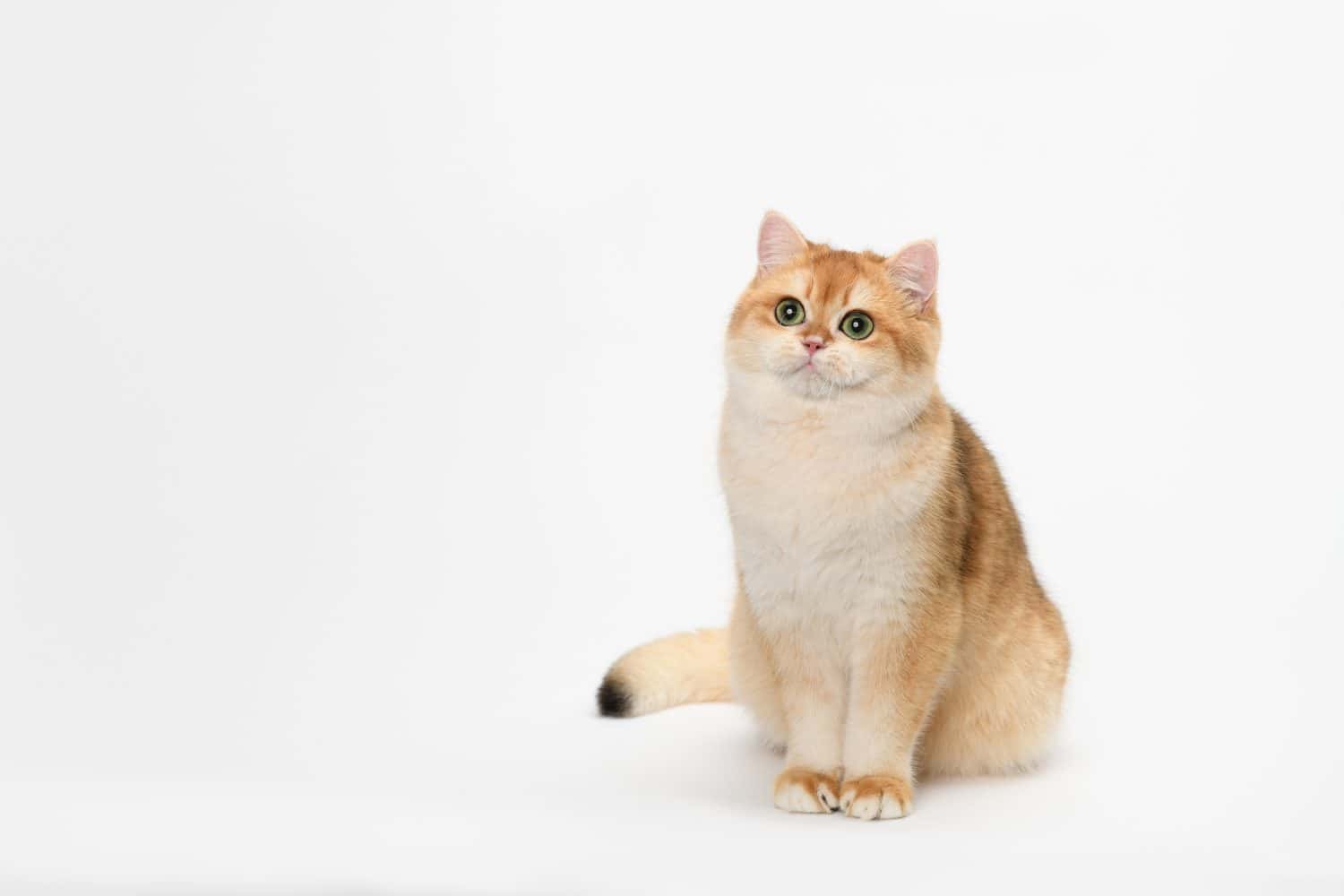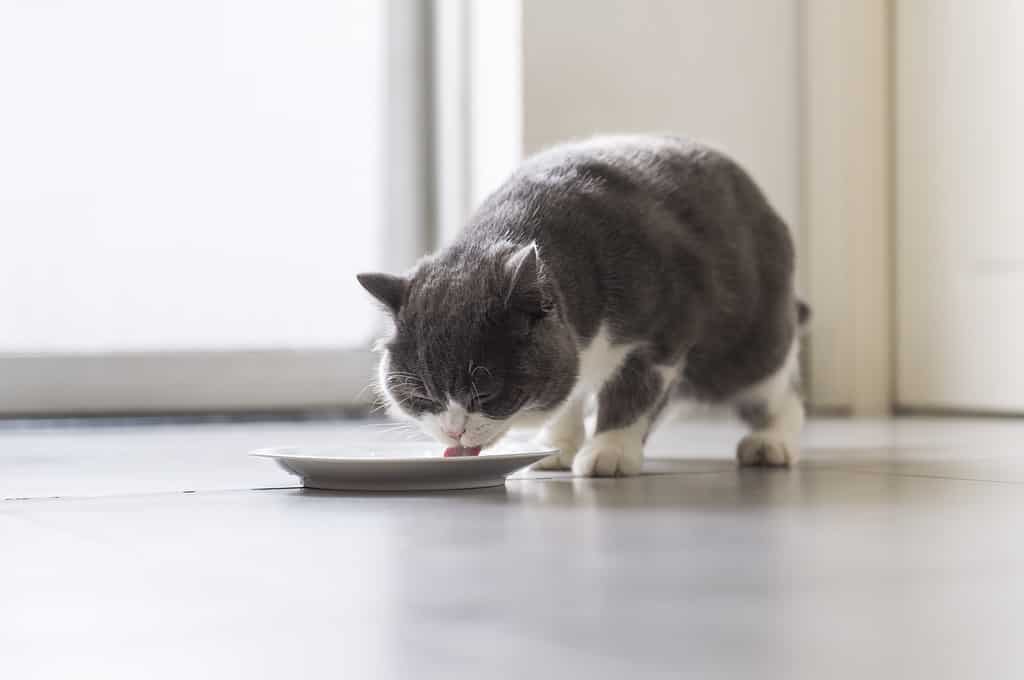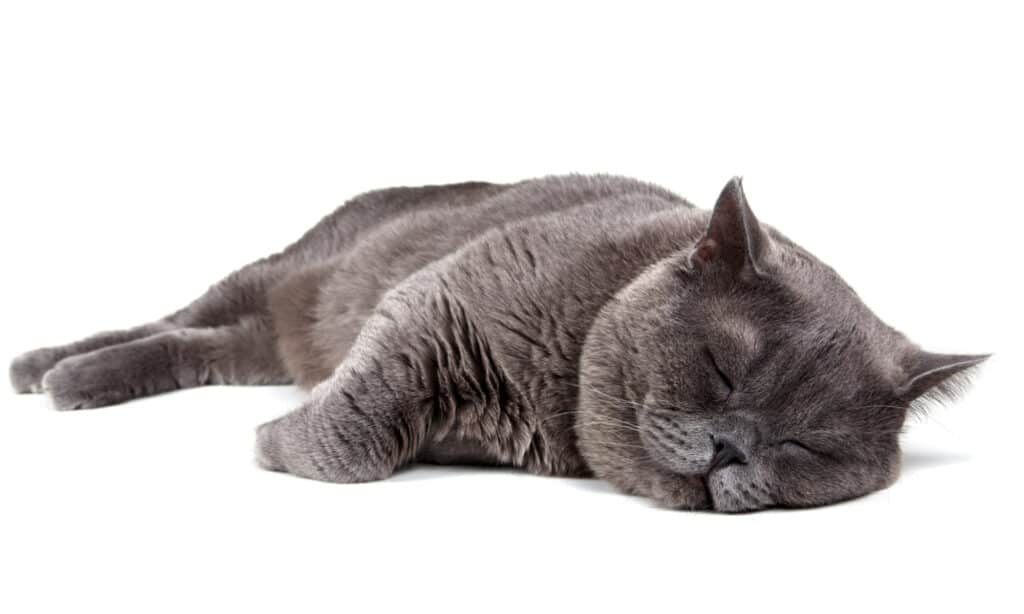Equally adorable as they are historic, British shorthairs are one of the most lovable cat breeds out there. If you’re the proud owner of one, you may have wondered how long you can expect to spend with your little best friend. Although it’s not a pleasant topic to think about, it’s important to know the average life expectancy of your British shorthair. Today, we discuss how long British shorthairs typically live, explore medical concerns specific to this breed, and talk about some ways you can ensure that your cat has a long life.
British Shorthairs: A Brief Overview

Although much smaller than Maine coons or ragdolls, British shorthairs are considered a larger breed.
©Thomas Leirikh/Shutterstock.com
The British shorthair is one of the oldest cat breeds that still remains widely popular to this day. However, their origin story is murky, and people have gone back and forth over the truth behind the development of this breed. According to Spruce Pets, “The most agreed-upon theory of this breed’s development is that British shorthairs started out as shorthaired street cats, but breeders refined and standardized the cats, likely crossing them with Persians and Russian blues, until they resembled the British shorthair we know and love today. British shorthairs were among the breeds exhibited at England’s first organized cat show in 1871”
The British shorthair is well known for its catalog of wonderful qualities. They have a relaxed and docile temperament, which makes them an excellent fit in homes with young children and other animals. They are sociable and curious, which gives them the ability to play nicely with strangers as well. Although they love to spread their sunshine to everyone, British shorthairs are especially partial to their immediate family. Often, these cats will pick one person in the household to bond with, and it may be obvious if they have a favorite. Despite this, they’ll still cuddle and seek attention from any of their humans. They don’t discriminate!
How Long Do British Shorthairs Live?

On average, British shorthair kittens cost between $700 and $3,000 from a breeder.
©g215/Shutterstock.com
It’s no secret that British shorthairs are a healthy cat breed who routinely live long and full lives. On average, British shorthairs will live to be between 12 to 15 years old. However, it is not unheard of for some of these cats to live into their twenties. How old your cat will grow depends on a few factors, such as their medical history, genetics, and diet.
The best way to prolong the life of your cat is to ensure that they live a healthy lifestyle. This includes things like monitoring their weight, making sure they get enough exercise, and bringing them in for yearly appointments. We’ll go into more detail about ways you can guarantee your British shorthair will live to be a ripe old age a little bit later on.
The Average Lifecycle of a British Shorthair

Although British shorthairs love to socialize, they aren’t attention-seeking and tend to be independent.
©chendongshan/iStock via Getty Images
When you bring your British shorthair home from the breeder or shelter, they’ll likely be between eight to fourteen weeks old. At this point, they’re kitten-aged, and it’s important to support them properly through the first few weeks of their development. After bringing your kitten home for the first time, it is important to bring them in for an initial health screening. In the event that the breeder missed a medical concern, your vet may be able to point it out. The quicker this is caught the better, as young kittens are at their most vulnerable state.
While they are kittens, they will be growing rapidly. British shorthairs typically gain a pound per month until they reach roughly six months of age. At this point, your kitten will be considered a teenager, and their development will continue but slow down a bit. This phase lasts until they are about one year old when they enter adulthood. Although they may have reached maturity at this age, they will continue growing until they are roughly five years old.
Health Concerns for British Shorthairs

There are over 30 different colorations and patterns of British shorthair cats.
©Alex Coan/Shutterstock.com
We know that nobody likes to think about it, but being prepared in the event of a medical emergency can be the difference between life and death. As we stated earlier, British shorthairs are hardy cats who aren’t plagued by a myriad of health concerns. However, there are some medical conditions that this breed is susceptible to that owners should be aware of. According to the Animal Health Clinic, “Like all cats, British shorthairs are susceptible to bacterial and viral infections such as panleukopenia, calicivirus, rhinotracheitis, and rabies, which are preventable through vaccination.” In addition, dental issues, cataracts, and obesity are relatively common in this breed.
Two of the most common medical conditions are Hypertrophic cardiomyopathy (HCM) and Hemophilia B. HCM is a heart disease in which the heart muscles begin to thicken whereas Hemophilia B is a bleeding disorder. Both of these conditions are genetic. Backyard breeders often don’t perform genetic testing on their animals, which increases the risk of your cat inheriting one of these diseases. Buying your cat from an ethical breeder greatly mitigates the chances of this happening. Although the price may be a little more expensive, the peace of mind provided is invaluable.
How to Ensure Your British Shorthair Lives a Long Life

Although their fur is fluffy and thick, the British shorthair does not shed much.
©OksanaSusoeva/Shutterstock.com
Making sure your cat is getting enough exercise and feeding them a nutritious diet is paramount in preserving their health. Owners should also consider neutering or spaying their British shorthair. Unless your cat is being used for breeding, it’s highly recommended that they undergo these procedures. British shorthairs that are left intact are at a higher risk of diseases like ovarian and testicular cancer. It’s important to have these operations done while your cat is still young, but not too young. Typically, the ideal age is between five and eighteen months old. There is little risk of neutering a cat older than this, but their recovery time will likely be longer. If you have any questions or concerns, set up an appointment to talk to your veterinarian directly.
In addition, taking them in for annual health screenings can be an excellent way to practice preventative care. Cats are experts are hiding their pain. Because of this, it may be hard for an owner to tell if something is brewing. An annual checkup may be responsible for catching a medical condition early on, and because of this, it may be easier to treat it. Try to schedule these appointments around your British shorthair’s birthday each year to make it easier to remember. In addition, purchasing a package of pet insurance is a wonderful safety net. In the event that your cat is diagnosed with a serious medical issue, it will take the financial strain off you and your family. Pet insurance is relatively affordable and typically starts at $20 per month.
Final Thoughts
Bringing a new pet home can be a fun time, and it’s easy to get swept away in the excitement of it all. However, educating yourself on the average lifespan and potential health risks of your pet is important as well. As always, every cat is different, and there’s no “one-size-fits-all” solution for every animal. Talk to your vet and come up with a plan that meets your British shorthair’s needs specifically to ensure that they live the longest and happiest life possible.
Thank you for reading! Have some feedback for us? Contact the AZ Animals editorial team.







